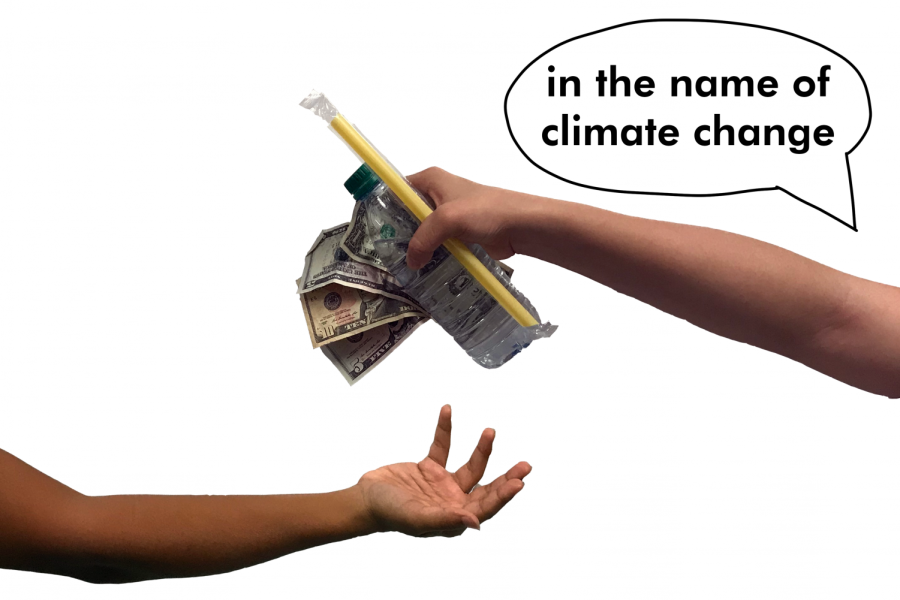Buying organic and becoming vegan: how much can these lifestyle changes help the environment?
May 3, 2019
To curb the effects of climate change, people are encouraged to make individual changes in their lives, from small ones such as using reusable grocery bags to larger lifestyle changes such as becoming vegan. While these changes collectively do have an effect, environmental movements must be more aware of factors that prevent everyone from being able to make these changes and shift their focus to changing the current societal system to be more environmentally-friendly. Moreover, holding corporations and governments responsible for their carbon footprint should be the greater focus and will create larger changes in the fight against climate change because these institutions contribute to and enable actions that harm the planet.
Climate change has always been a critical issue, but conditions are becoming increasingly worse. Thus, it is imperative that this issue is addressed as soon as possible. According to a special report published in 2018 from the Intergovernmental Panel on Climate Change, human activities have already caused an increase in global temperature of approximately 0.8 to 1.2 degrees Celsius from the pre-industrial global temperatures, and if such increases continue at the current rate, between 2032 and 2052, there will be a total increase of 1.5 degrees Celsius. Higher temperatures are predicted to increase the likelihood of extreme weather and cause the rising of sea levels. In addition, these conditions will result in habitat loss and degradation and a loss of biodiversity.
“One thing that a lot of people don’t realize is that climate change really affects our future. Climate change keeps continuing to become more problematic,” said Shanelle Craig, senior and Conservation Action Association Public Relations Officer. “Climate change affects quality of life, as well as the Earth itself, and people need to know that protecting the Earth has to do with the future of the environment and the Earth’s resources.”
To address these issues, a solution offered for individuals is to make lifestyle changes, such as producing zero waste, becoming vegan and buying organic food. While these changes are by no means negative, they can be reduced to feel-good actions that have a limited ability to truly create change. Changes need to be made on a massive scale for efficacy, but these lifestyle changes are only an option for a select few. Socioeconomic factors make it difficult for many consumers to implement these changes in their lives. For example, organic and environmentally-friendly products are typically pricier than their w`conventional counterparts, and practices such as cooking meals at home require a time investment that working-class families may not have. Because so many people are unable to make these changes, this solution is not effective unless something is done to increase the accessibility of living green, which calls for making larger changes in society as a whole.
“You can’t change at the individual behavioral level easily, unless the system around you changes and allows you to make those choices more easily,” said Costanza Rampini, San Jose State University assistant professor. “For example, one of the factors that is causing a lot of deforestation in Southeast Asia is palm oil production. We have palm oil in a lot of our different products, from medicine to food to soap, but it’s really hard for the consumer to be able to discern what products have it because they use a variety of different names for the compounds that are used. It’s really up to the system around us to provide us with options to make it easy for us to make those choices, such as for urban planners to rethink our transportation system.”
Another proposed solution by environmentalist movements is to eliminate products and tools deemed wasteful and unnecessary. However, such items may be essential for those who are disabled. Pre-cut fruit and vegetables packaged in plastic, for example, are often criticized, but they are a necessity for those who cannot cut or peel produce themselves due to limitations such as reduced hand dexterity or chronic pain. Removing these products denies disabled individuals access to healthy dietary options. Plastic straws have been denounced for contributing to ocean pollution, but many disabled individuals require straws for drinking and have made clear that alternatives made with materials such as glass and steel are not an option for them. Able-bodied individuals should not be the ones to determine what disabled individuals are able or unable to use. Although these tools can have some negative effects on the environment, they are essential to the health and wellbeing of many disabled individuals, and these disabled individuals should not be shamed for using tools that allow them to live and thrive.
Rather than directing negative attention to the users of these tools or those who cannot make environmentally-friendly changes in their lives, environmental movements should divert their focus to finding accessible alternatives while taking disabled and socioeconomically disadvantaged individuals into account. Currently, the ability to make changes to help the environment is often limited to wealthy, able-bodied people. However, for such changes to make a difference, they need to be adopted by more people, which makes it necessary to increase the accessibility of environmentally friendly options.
Even if lifestyle changes were implemented on a large scale, they can only do so much to help since society’s dependence on fossil fuels and other harmful products is the primary cause for climate change. The largest contributors to greenhouse gas emissions are fossil fuel companies; the 2017 Carbon Majors Report by the Carbon Disclosure Project revealed that just 25 corporate and state fossil fuel companies are responsible for 51 percent of all global greenhouse gas emissions. Citizens may try to limit their own carbon footprints, but these small-scale actions cannot fully make up for the environmental damages caused by companies; thus, companies must be held accountable for their contributions to climate change.
“If companies feel that public opinion is becoming more environmentally conscious, then they’re going cater to those beliefs because it will help with their profit margin,” said Roopak Phatak, senior and Hiking and Environmental Impact club officer. “Just raising awareness of climate change could create a difference because public opinion may change, and as a result, companies would start realizing the impacts of their actions. They may shift more time and resources to developing more environmentally friendly options.”
Rather than solely focusing on making individual changes, people must also come together to lobby governments and corporations for change. It is important to vote for officials who actively take action against climate change and hold elected officials responsible for their votes regarding the issue. Eco-conscious legislation can help change the actions of companies by encouraging them to make sustainability a priority and reducing the amount of environmental harm companies are allowed to inflict. Environmentalist movements would benefit from advocating for the use of legal action to fight climate change.
While people should make small, environmentally-conscious lifestyle changes, those who are unable to do so should not be blamed because these options can often be expensive and inaccessible. Environmental movements should be made more accessible so that everyone, not only the rich and abled, can collectively make a difference. Even if many people are able to make these changes in their lives, it is also important to hold governments and corporations responsible for their actions to effectively combat climate change.


































































